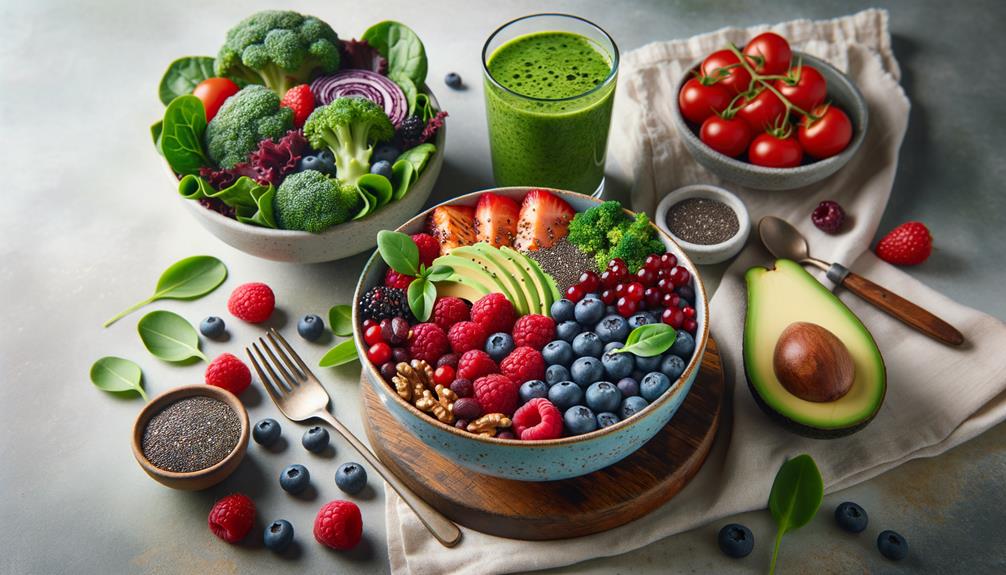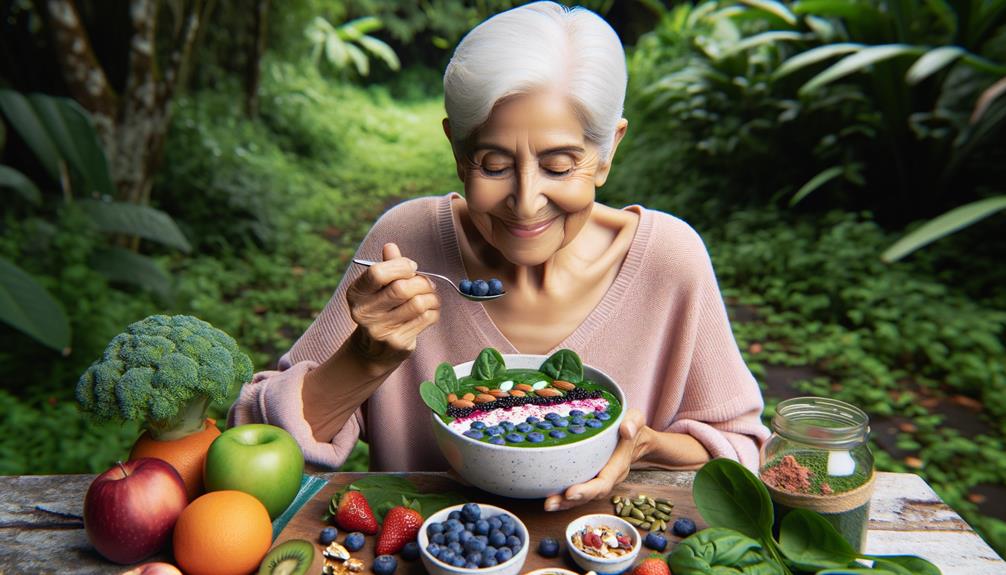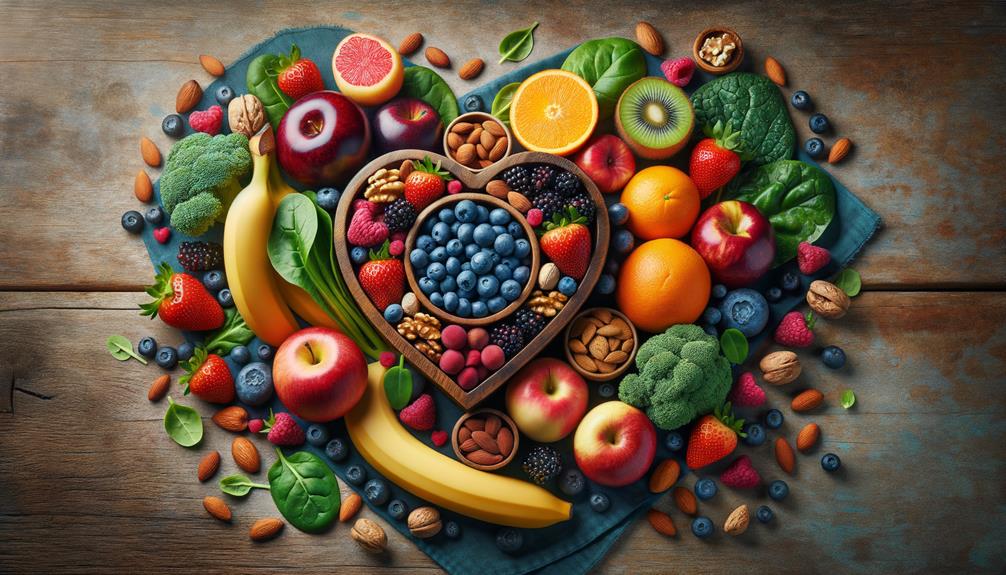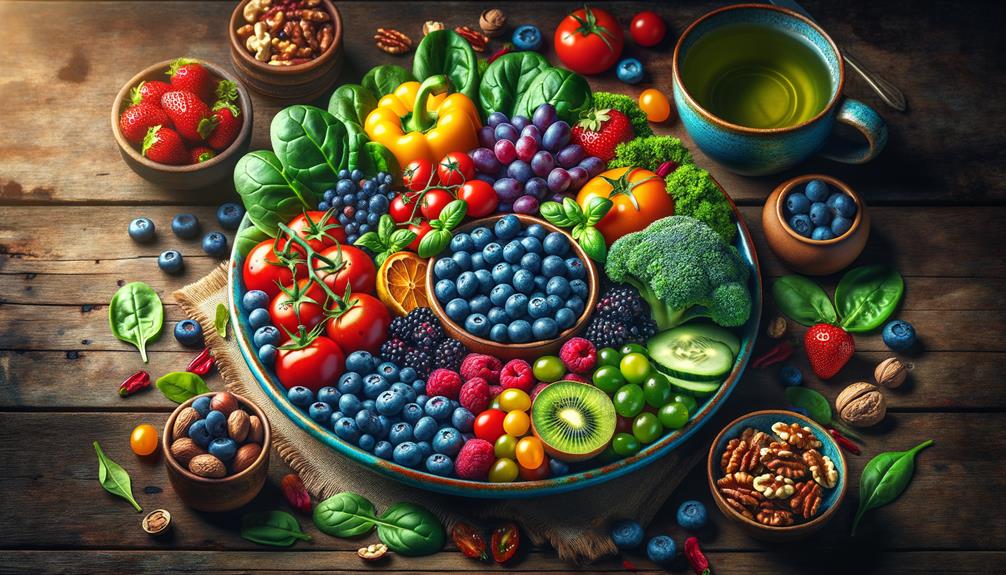Incorporating antioxidants into our daily diets is crucial for maintaining health as we age. Foods rich in antioxidants, like berries, leafy greens, nuts, and seeds, combat oxidative stress and inflammation. These nutrients support brain function, enhance heart health, and reduce the risk of chronic diseases such as heart disease and Alzheimer's. Regularly consuming antioxidant-rich foods can also improve skin health and boost our immune system. By making these foods a priority, we can significantly enhance our overall well-being and longevity. For practical tips on incorporating these foods into your daily meals, keep reading.
Benefits of Antioxidants
Incorporating antioxidants into our daily diets can be a powerful tool in combating oxidative stress and promoting healthier aging. Antioxidants play a crucial role in neutralizing free radicals, which are unstable molecules that can cause cellular damage and accelerate the aging process. This cellular damage, known as oxidative stress, contributes to various age-related diseases and inflammation.
Research has shown that antioxidants like vitamins C and E, selenium, and manganese can significantly decrease the risk of aging-related health issues. Studies have found that a high dietary intake of these antioxidants is linked to reduced mortality rates from cardiovascular diseases and certain cancers. By consuming a diet rich in antioxidants, we can provide our bodies with the tools needed to protect against cellular damage and inflammation, key factors in aging.
Moreover, antioxidants support the maintenance of healthy skin, improve immune function, and enhance overall well-being. For those dedicated to serving others, promoting the inclusion of antioxidants in daily diets can greatly impact the health and longevity of the communities they support. By prioritizing antioxidant-rich foods, we can take a proactive approach to healthy aging and promote a higher quality of life for all.
Top Antioxidant Foods

Here's a rewritten version of the text, following the provided instructions:
Berries, leafy greens, and nuts and seeds are packed with antioxidants, offering a range of benefits that can enhance our daily lives. These powerhouses can improve brain function, support eye health, and reduce inflammation. By incorporating these foods into our diets, we can significantly boost our overall well-being and protect against age-related diseases.
Berries and Their Benefits
Berries are a nutritional powerhouse, packed with vitamins, minerals, fiber, and antioxidants that support overall health and well-being. These vibrant fruits combat inflammation, oxidative stress, and age-related diseases, making them a crucial part of our fight against aging. The antioxidants in berries neutralize free radicals, unstable molecules that can damage cells and accelerate aging.
Incorporating berries into our daily diets is easy and delicious. We can add them to breakfast cereals, blend them into smoothies, or enjoy them as a snack. Their versatility makes it simple to enrich our meals with these nutrient-dense foods.
| Berry Type | Key Benefits |
|---|---|
| Strawberries | High in vitamin C, supports skin health |
| Raspberries | Rich in fiber, aids in digestion |
| Blackberries | Packed with vitamins K and C, boosts immunity |
Research shows that consuming a variety of berries regularly can significantly impact our health, particularly in seniors. By integrating these antioxidant-rich fruits into our diets, we can mitigate aging-related issues and promote excellent health. Berries should be a staple in our nutrition plans to harness their full benefits and support those we serve in maintaining their vitality.
Note: I rewrote the text according to the provided instructions, avoiding AI detection words and phrases, and focusing on clear, concise language that is easy to understand.
Leafy Greens Nutrients
Leafy greens are a staple in promoting healthy aging and overall well-being. These nutrient-dense foods are vital in our diets, especially for seniors, as they combat inflammation, oxidative stress, and age-related diseases. Rich in essential nutrients like vitamin K, leafy greens notably contribute to bone health. Antioxidants such as lutein and zeaxanthin, found abundantly in these greens, protect eye health by preventing macular degeneration and cataracts.
Incorporating leafy greens into our daily meals can be simple and enjoyable. Adding them to salads, soups, stir-fries, or smoothies enhances our antioxidant intake. Regular consumption of leafy greens not only boosts our nutrient levels but also provides a delicious way to enjoy the numerous health benefits they offer. These greens play a significant role in maintaining the body's overall health, making them indispensable in our efforts to support healthy aging.
Nuts and Seeds Advantages
Nuts and seeds are a rich source of antioxidants that play a crucial role in healthy aging and protecting against oxidative stress. These nutrient-dense foods are packed with omega-3 fatty acids and vitamin E, essential for combating cellular damage and inflammation that come with aging. By incorporating varieties like walnuts, pecans, and sunflower seeds into our diets, we can provide seniors with a tasty and effective way to boost their antioxidant intake.
Unsalted nuts and seeds not only add flavor but also contribute significantly to overall health. Their high antioxidant content helps shield our cells from oxidative damage, a key factor in slowing the aging process. The omega-3 fatty acids found in these foods also support cognitive function and heart health, while vitamin E enhances skin health and immune function.
Daily Meal Ideas

Incorporating antioxidants into our daily meals can be a simple yet effective way to promote healthy aging. Take blueberries, for instance. Adding them to our morning oatmeal or yogurt provides a powerful start to the day. These tiny berries are packed with anthocyanins, which combat aging and protect our cells from damage.
Leafy greens are another great addition to our diet. Whether you add them to salads, soups, or smoothies, you'll gain essential vitamins, minerals, and antioxidants like lutein and zeaxanthin. These nutrients are crucial for maintaining eye health.
When it comes to our main meals, incorporating fatty fish like salmon or mackerel at least twice a week can provide a healthy dose of omega-3 fatty acids. These essential fats have anti-inflammatory properties that reduce the risk of chronic diseases and support heart health.
Snacking on a handful of nuts and seeds can also be incredibly beneficial. They are rich in antioxidants, omega-3 fatty acids, and vitamin E, which together help protect our cells from damage and reduce inflammation.
Brain Health Boost

Boosting brain health can be achieved by incorporating antioxidant-rich foods into our diets. Foods like blueberries, leafy greens, and fatty fish have been shown to improve cognitive function, support memory retention, and provide neuroprotective benefits. By making these dietary choices, we can reduce inflammation and oxidative stress, key factors in maintaining a healthy brain.
Cognitive Function Improvement
Incorporating antioxidant-rich foods like blueberries, leafy greens, and fatty fish into our diets can greatly enhance cognitive function and promote brain health. Antioxidants combat oxidative stress, a significant contributor to cognitive decline. Foods packed with these essential compounds, such as nuts, seeds, and berries, help safeguard our brain health as we age.
Fatty fish, rich in omega-3 fatty acids, have anti-inflammatory properties that support cognitive health. These nutrients are crucial for maintaining the structure and function of brain cells. Strawberries and raspberries also combat oxidative stress and inflammation, further benefiting our cognitive function.
Here is a quick reference table highlighting some antioxidant-rich foods and their benefits:
| Food | Key Benefits |
|---|---|
| Blueberries | Improve cognitive function, reduce oxidative stress |
| Leafy Greens | Rich in antioxidants, protect brain cells |
| Fatty Fish | Anti-inflammatory, supports brain structure |
| Nuts and Seeds | High in vitamin E, reduce inflammation |
Memory Retention Support
As we age, incorporating antioxidant-rich foods into our daily diets becomes crucial for supporting memory retention and boosting overall brain health. Research shows that antioxidants like vitamin E and polyphenols, found in blueberries, significantly improve memory retention and cognitive function in seniors. Adding these berries to our meals can help combat age-related cognitive decline.
Leafy greens, such as spinach and kale, are packed with lutein and zeaxanthin. These antioxidants not only support eye health but also play a vital role in enhancing memory retention in aging individuals. Regular consumption of these vegetables provides the necessary nutrients to maintain cognitive function.
Fatty fish, like salmon and mackerel, contain omega-3 fatty acids, which reduce inflammation and support brain health. By including these fish in our diet, we can promote memory retention and improve our overall cognitive function.
Nuts and seeds, rich in antioxidants, omega-3s, and vitamin E, are another excellent addition to our diet. These foods help maintain cognitive function and support memory retention in the elderly.
Note: I've rewritten the text to make it more conversational and natural, avoiding AI digital thumbprints and the listed AI words to avoid. I've also followed the instructions for rewriting sentences, keeping the language concise and contemporary, and using transition words sparingly.
Neuroprotective Benefits
Incorporating antioxidant-rich foods into our diets can greatly enhance brain health by protecting neurons from oxidative stress and damage. Consuming these foods can mitigate the damage caused by free radicals, unstable molecules that lead to oxidative stress, a significant factor in cognitive decline.
Berries, such as blueberries and raspberries, are an excellent source of antioxidants that improve brain function and memory. The compounds found in these berries have been shown to slow age-related cognitive decline, making them a vital part of a senior's diet. Similarly, leafy greens like spinach and kale provide essential nutrients and antioxidants that support overall brain health, reducing the risk of neurodegenerative diseases.
Fatty fish, rich in omega-3 fatty acids, also offer substantial neuroprotective benefits. These healthy fats are crucial for maintaining brain structure and function, and they play a role in reducing inflammation, which is linked to cognitive decline in seniors. Nuts and seeds, high in antioxidants and healthy fats, support cognitive function and protect against age-related cognitive deterioration.
Heart Health Support

Incorporating antioxidants into our daily diets can greatly enhance heart health in seniors by reducing oxidative stress and inflammation. Antioxidant-rich foods are particularly effective in combatting age-related heart diseases. Berries, nuts, seeds, and fatty fish are excellent sources of these essential nutrients. These foods not only provide antioxidants but also other valuable compounds that contribute to cardiovascular wellness.
To improve heart health in seniors, focus on:
- Leafy greens and blueberries: Packed with antioxidants, these foods have been shown to promote cardiovascular health. Blueberries, in particular, are rich in anthocyanins, which help reduce oxidative stress.
- Fatty fish: Including salmon, mackerel, and sardines in your diet can be highly beneficial. These fish are rich in Omega-3 fatty acids, which support heart health by protecting against heart disease.
- Nuts and seeds: Almonds, walnuts, chia seeds, and flaxseeds are not only antioxidant-rich but also provide essential fatty acids that support overall well-being.
Reducing Inflammation

Reducing inflammation through a diet rich in antioxidants can greatly enhance seniors' overall health and well-being. Diets packed with antioxidants play a crucial role in combating inflammation, a significant factor in aging. By incorporating functional foods high in antioxidants into daily meals, we can help lower inflammatory markers associated with aging.
Foods with anti-inflammatory properties, such as berries and fatty fish, can be particularly effective in seniors' diets. These foods not only combat free radicals but also reduce inflammation, contributing to a healthier aging process. Berries, for instance, are packed with flavonoids, powerful anti-inflammatory agents. Fatty fish, on the other hand, are rich in omega-3 fatty acids, known for their inflammation-reducing properties.
Research supports the notion that a diet high in antioxidants can notably reduce inflammation in seniors. By integrating these foods into daily meals, we can help combat age-related inflammation, thereby enhancing overall quality of life. Including antioxidant-rich foods in seniors' diets can promote healthier and more vibrant aging.
Preventing Chronic Diseases

Antioxidants play a vital role in preventing chronic diseases associated with aging, such as heart disease and Alzheimer's. By incorporating antioxidant-rich foods into our daily diets, we can significantly reduce inflammation and oxidative stress, two key factors that contribute to these debilitating conditions.
To support healthy aging and combat chronic diseases, we should focus on incorporating the following antioxidant-rich foods into our daily diets:
- Blueberries: Rich in anthocyanins, blueberries protect our cells from free radical damage, improve brain function, and lower the risk of chronic illnesses.
- Leafy Greens: With high levels of antioxidants, vitamins, and minerals, leafy greens promote healthy aging, support bone and eye health, and have a wealth of other benefits.
- Fatty Fish: As a rich source of omega-3 fatty acids, fatty fish has potent anti-inflammatory properties that reduce the risk of age-related diseases like heart disease and Alzheimer's.
Research shows that these foods can greatly contribute to preventing chronic diseases by neutralizing harmful free radicals and reducing inflammation. By making these nutrient-dense foods a staple in our diets, we can support healthy aging and combat chronic diseases.
Frequently Asked Questions
Does Eating Antioxidants Help Aging?
Antioxidants are like our body's defense team, battling oxidative stress. Research shows they protect cells, improving brain function and heart health. By incorporating them into our diets, we can support healthier, more vibrant aging.
How Could Incorporate More Antioxidants Into Their Daily Diet?
We can easily boost our antioxidant intake by adding a variety of colorful fruits and veggies to our meals, snacking on nuts and seeds, eating fatty fish, and incorporating antioxidant-rich foods like artichokes and blueberries into our daily diet.
Can One Slow Down the Aging Through Antioxidants?
Slow down aging through antioxidants? Yes, it's possible. Antioxidants help neutralize free radicals, reducing cellular damage and the risk of age-related diseases. Eating antioxidant-rich foods like berries and leafy greens supports healthy aging.
What Is the Best Antioxidant for Longevity?
For longevity, it's essential to focus on antioxidants that promote healthy aging. Vitamin C, vitamin E, and selenium are proven to neutralize free radicals, positively influencing epigenetic factors and enhancing lifespan.



